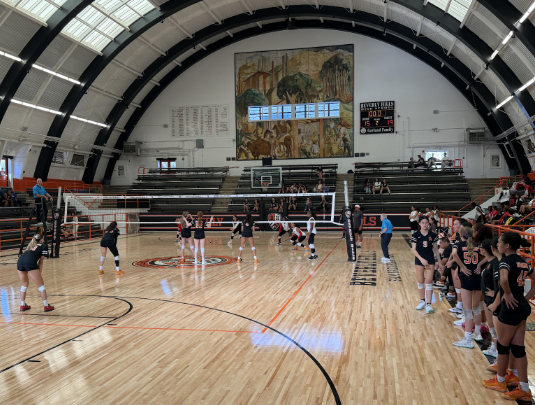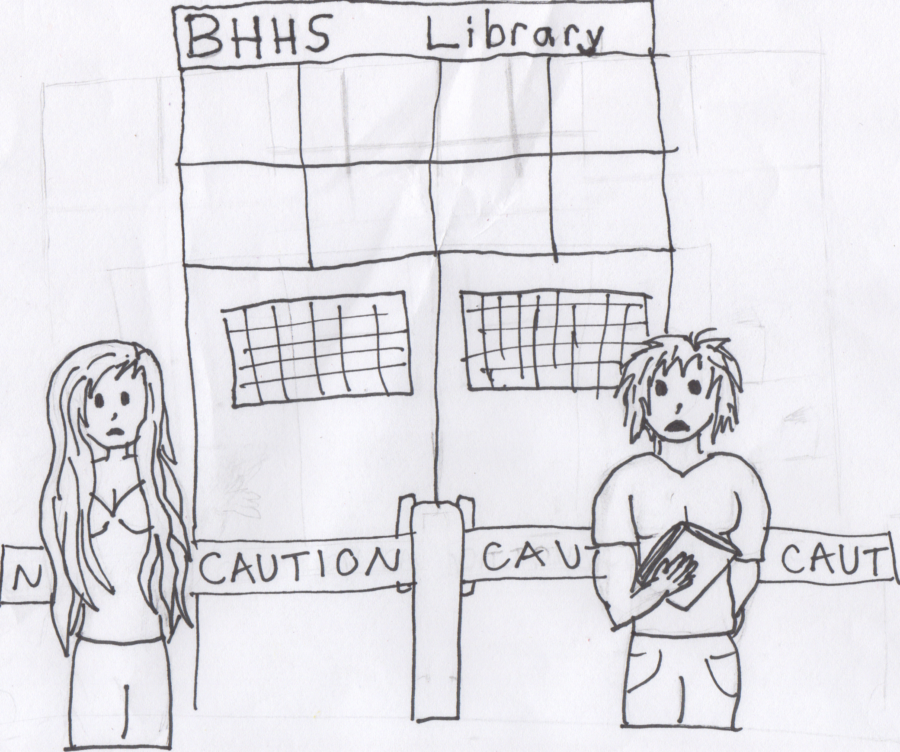Mabel Kabani, print editor-in-chief
As high schoolers living in Beverly Hills, Calif., we like to think of ourselves as smart, progressive and forward-thinking students who challenge stereotypes, promote unity and fight inequality, regardless of race, religion or sexual orientation. Though we rush to defend attacks and condemnations against the cultures, backgrounds and socioeconomic conditions of our peers, one issue remains unchallenged. The practice of debasing and stigmatizing a female based on her outfit and sexual behaviors has not only gone undefended, but also remains understood and even encouraged. Walk across the front lawn and you can see boys and girls whispering: “her shorts are so short” and “she literally hooks up with every guy; what a slut.” In class, teachers stare girls up and down and judge them based on the amount of visible skin they see. Some students are spoken to privately about the importance of self-respect and dignity, even if the reprimanded high schooler isn’t violating school dress code.
Rather than defend our fellow female high schoolers who are judged and condemned for embracing their bodies and their sexualities, we live in a society where the default for conversation about sexuality is filled with worry. Rather than defend victims of slut-shaming, we’ve come to think of the practice as normal and even morally righteous.
Slut-shaming (an act of making a person of any gender, although usually women, feel guilty and inferior for having sexual desires and behaviors that deviate from orthodox and traditional expectations of society) is the opposite of everything feminism, a practice, culture and lifestyle that encourages women to embrace who they are and to fight for their equality and empowerment, stands for. By warning women that there is a line between being the right amount of sexual versus being too sexual, we as a society are deciding what differentiates a classy and intelligent woman from a trashy and insignificant “slut” simply based on what she wears and who she’s involved with.
Though the word “slut,” according to the Oxford English Dictionary, simply describes a person who has had multiple sexual partners, it has, over time, attained a negative connotation. As long as gendered slurs, a form of microaggression, such as “slut” continue to be used as verbal weapons that are casually branded against women by both genders, any woman who acts in a way that another human being does not approve of is at risk of being slut-shamed. According to an article on slut-shaming featured in Teen Vogue, any woman who dresses provocatively, requests birth control, engages in premarital sex or has been raped is equally likely to be called a “slut,” “whore” or “tramp.”
According to the Cambridge University Press, there are 220 words used to describe a sexually promiscuous woman, while there are only 20 that describe a sexually promiscuous man; however, the difference in connotation is a bigger issue than the difference in number. Words like “Romeo” and “Casanova” are ones attributed to men who engage in a healthy dose of sexual conduct. These men are admired and romanticized and even the words attributed to them stem from famous literary works. Sexually active women, however, are described as “harlots” and “whores,” words that aren’t romanticized, but are associated with prostitutes.
The double standard that men who have sex with multiple partners are considered heroes while women who do the same are disgraced emphasizes the point that slut-shaming is directed primarily toward women.
Though women tend to be victims of slut-shaming, men are not the only perpetrators; in fact, women participating in internalized sexism are even more at fault than men. Women attempting to compete with each other for male approval in a patriarchal society that defines the worthiness of women based on their physical attractiveness limits their ability to distinguish themselves by other means. By allowing beauty to define self worth, women condescend others who are better at grabbing the attention of men. We see girls who are able to attract and seduce men that we can’t, so we become jealous; we call those girls sluts. We see women wearing daring and provocative outfits that we wish we had the guts to wear, but we don’t; we call those women sluts. We are allowing a woman’s interaction with a man to define her existence and are therefore encouraging the usage of the word “slut,” which can come with dire consequences.
According to the New York Times, women who are named sluts can become targets of harassment and rape, become increasingly sexually active after they have been labeled so or shut off their sexual side in order to mend their reputation. Rather than continue to use the word “slut” as a debasing insult in order to define a woman, we should simply abandon the usage of the word altogether and abandon the practice of looking down on women who embrace their sexual sides, even if it contradicts the norms of society. Slut-shaming has been prevalent in society even before the spread of literature like “The Scarlet Letter,” and “Anna Karenina” and is still just as present in society as the world’s reaction to Miley Cyrus’ VMA performance displays.
Slut-shaming has existed for centuries, and the practice has remained unquestioned; however, movements like the SlutWalk are raising awareness of the negative effects of this habit. After a Toronto officer claimed that “women should stop dressing like sluts to avoid getting raped,” Toronto citizens began a protest against slut-shaming, as they “are tired of being oppressed by slut-shaming; of being judged by sexuality and feeling unsafe as a result.” They believe that being in charge of their sexual lives should not mean that they are opening themselves up to violence and disrespect. Though this movement started off as a local protest, it has grown and spread to other countries and regions of the world such as Latin America, India, Singapore and the United States; SlutWalk is the strongest feminist movement in the past 20 years.
“SlutWalks stand out as a reminder of feminism’s more grassroots past and points to what the future could look like,” Jessica Valenti, an author and one of The Guardians’ Top 100 Women, said.
Around the world, women are constantly made to feel like victims and made to feel inferior for whatever sexual desires they may have. They are constantly scolded and judged for looking a certain way and told to “not go out at night…get drunk…wear high heels or make up,” according to Valenti.
By negatively labeling women in society who disregard traditional gender roles and expectations, we as a society are allowing and encouraging others to judge the integrity of a person based on their sexual preferences and outward appearances. By imposing our views on others, we victimize those who embrace and love who they are as women and incite these brave females to look down upon themselves through the conservative eyes of society, causing many to lose sight of who they truly are.
































